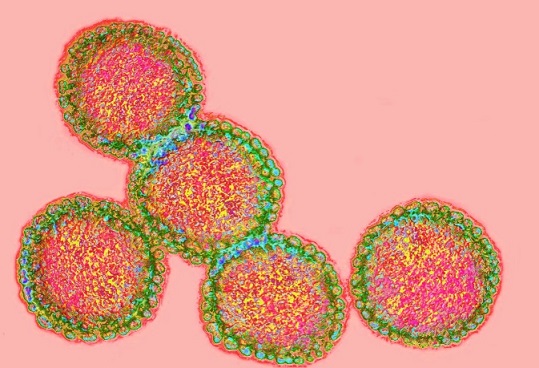Nikhil Prasad Fact checked by:Thailand Medical News Team Feb 22, 2025 1 month, 3 weeks, 5 hours, 34 minutes ago
Medical News: A new study has unveiled the vital role of leptin, a hormone commonly associated with regulating appetite and metabolism, in maintaining physiological stability during severe influenza infections. Conducted by researchers from Harvard Medical School, Rockefeller University, Weill Cornell Medicine, Memorial Sloan Kettering Cancer Center, and UT Southwestern Medical Center, the study highlights the impact of leptin deficiency on immune response and survival rates in mice infected with influenza.
 American Scientists Discover Key Role of Leptin in Fighting Severe Influenza
The Connection Between Leptin and Influenza
American Scientists Discover Key Role of Leptin in Fighting Severe Influenza
The Connection Between Leptin and Influenza
Leptin is primarily known for its role in energy regulation, but scientists have long suspected that it also plays a part in immune function. To investigate this, researchers conducted experiments on leptin-deficient mice, known as ob/ob mice, and compared them with diet-induced obese (DIO) mice. This
Medical News report reveals that while both groups had similar metabolic conditions, only the leptin-deficient mice suffered extreme mortality after being infected with the influenza virus.
The study demonstrated that 100% of leptin-deficient mice succumbed to the infection, whereas those with normal leptin levels survived. When chronic leptin supplementation was introduced, mortality was completely reversed, emphasizing leptin’s crucial role in preventing fatal outcomes during severe influenza infections. However, short-term leptin administration before infection had no effect on survival, suggesting that continuous leptin presence is necessary for protective benefits.
How Leptin Influences the Immune System
To understand how leptin protects against influenza, researchers examined the immune responses of leptin-deficient and leptin-supplemented mice. They measured the levels of antiviral cytokines and chemokines, molecules that help regulate immune responses. One day after infection, leptin-treated mice exhibited increased levels of key immune molecules, which then normalized by the fourth day of infection. This controlled immune response likely contributed to better survival outcomes.
Further analysis using RNA sequencing of lung and spleen tissues showed that leptin supplementation enhanced immunological activation, particularly in T cell pathways. In the spleen, the presence of T cells associated with antiviral responses was significantly higher in leptin-treated mice. This suggests that leptin not only improves immune function but also helps regulate immune cell activity during viral infections.
Leptin’s Role in Preventing Heart and Temperature Irregularities
Interestingly, despite showing an improved immune response, leptin-treated and leptin-deficient mice had similar levels of viral clearance. This indicated that leptin’s protective effect was not solely due to enhanced immunity but also related to autonomic stability. The researchers observed that leptin-deficient mice experienced severe bradycardia (dangerously slow heart rate) and hypothermia befo
re death, conditions that were completely prevented with leptin supplementation.
This finding suggests that leptin plays a fundamental role in maintaining normal physiological functions, such as heart rate and body temperature, which are often disrupted during severe infections. Scientists believe that leptin interacts with the hypothalamus, a brain region responsible for regulating these functions, ensuring stability even in the face of a serious viral challenge.
What This Means for Human Health
While the study was conducted on mice, its findings have significant implications for human health, particularly for individuals with leptin deficiencies or metabolic disorders. People with obesity, diabetes, or certain genetic conditions may have impaired leptin signaling, potentially making them more vulnerable to severe infections like influenza.
The research also opens the door to new therapeutic strategies. By targeting leptin pathways, scientists could develop treatments aimed at stabilizing autonomic functions in critically ill patients, reducing complications from viral infections, and improving survival rates. Further studies will be needed to explore the potential of leptin-based therapies in humans and to determine whether similar protective effects can be achieved.
Conclusion
This groundbreaking research highlights leptin’s essential role in maintaining physiological stability during severe influenza infections. The study found that leptin-deficient mice were highly susceptible to mortality due to complications such as bradycardia and hypothermia, rather than an inability to clear the virus.
Chronic leptin supplementation completely reversed these effects, proving its importance in autonomic stability. The research underscores the need for further investigation into leptin’s potential therapeutic applications, particularly for individuals with metabolic disorders. Understanding and harnessing leptin’s protective properties could lead to novel treatments for severe viral infections and critical illness in vulnerable populations.
The study findings were published in the peer-reviewed journal: The Journal of Clinical Investigation.
https://www.jci.org/articles/view/182550
For the latest Influenza news, keep on logging to Thailand
Medical News.
Read Also:
https://www.thailandmedical.news/news/herbs-and-phytochemicals-fermented-codonopsis-lanceolata-root-extract-shows-promise-against-influenza-a-virus
https://www.thailandmedical.news/news/selenium-strengthens-immunity-and-helps-fight-viral-diseases-including-covid-19-and-influenza
https://www.thailandmedical.news/news/eucalyptus-extract-shows-promise-against-coronaviruses-and-influenza-viruses
https://www.thailandmedical.news/articles/influenza-or-flu
https://www.thailandmedical.news/pages/thailand_doctors_listings
